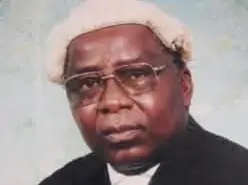The Cameroonian-born Defense Counsel at the International Criminal Court, Chief Charles Taku, has regretted the involvement of traditional rulers from the troubled Anglophone regions in the endorsement of 91-year-old President Paul Biya for another mandate.
Charles Taku argues that their involvement in the endorsement of Biya undermines the sacredness of royalty in the Anglophone Regions.
He also argued that this defeats the purpose of a ‘special status’ which the government accorded to the two regions in 2019, recognising the sacredness of their traditional institutions.
His reaction came after some 200 traditional rulers in Cameroon met in Yaounde on January 27 after which 12 traditional rulers, including three from the Anglophone regions, signed a declaration endorsing Paul Biya’s candidacy for this year’s Presidential elections.
The decision sparked reactions about the political neutrality of traditional Chiefs in Cameroon.
A Legal Take
Chief Taku views the endorsement from a legal perspective.
To him, the traditional rulers’ meeting, chaired by the Minister of Territorial Administration, “exposed the facetious nature of Special Status” and the House of Chiefs, which he described as a “masquerade in royal regalia”.
The Special Status and House of Chiefs he talked about are unique to the conflict-hit Anglophone regions, previously Southern Cameroons.
These regions, which are in a separatist conflict since 2017, received a “special status” after a 2019 National Dialogue to held address the ongoing conflict
“Special Status was presented as a ‘Deliberative Organ’ comprising ‘Regional Assemblies’ made up of ‘Divisional Representatives’ and House of Chiefs in the captive genocide enclave to symbolise and emphasise its distinctive enslaved identity,” Chief Charles Taku recalled.
The House of Chiefs, he added, derived its existence, legitimacy and special status from the December 2019 law to institute the general code of regional and local authorities.
Given the Special Status of Anglophone Regions, Chief Taku argues that the Anglophone Chiefs should have remained ‘special’ by refraining from the endorsement of Biya.
But their involvement in his endorsement, he argued, defeated the special status they enjoy.
He Anglophone Chiefs’ and endorsement of Biya is “inconsistent with Southern Cameroons cultural and institutional values and its international legal identity.”
He added: “This defeats its so-called special status and its organisational goals stated in its enabling legislation.”
‘State Capture’ of Chieftaincy
Chief Taku observed that traditional rulers’ endorsement of Paul Biya implied a “State capture of the Chieftaincy institution and its transformation into a propaganda tool for the perpetuation of imperial rule in NOSO.”
He bemoaned that Anglophone traditional rulers, who previously commanded respect for their political neutrality and commitment to justice, have compromised these values.
“Will genuine Southern Cameroons Chiefs who are committed to be different from their corrupt peers and have made a choice to be genuine custodians of our cultures and traditions; liberating consciences of our humanity, our ancestral bonds of freedom, of justice for the dead, for the living, the unborn; of peace and of the sanctity of life, of the morality of spiritual values, of our individual and collective survival in a world environment at war with its soul, stand up now and be counted?” he said.



